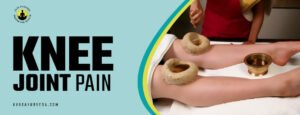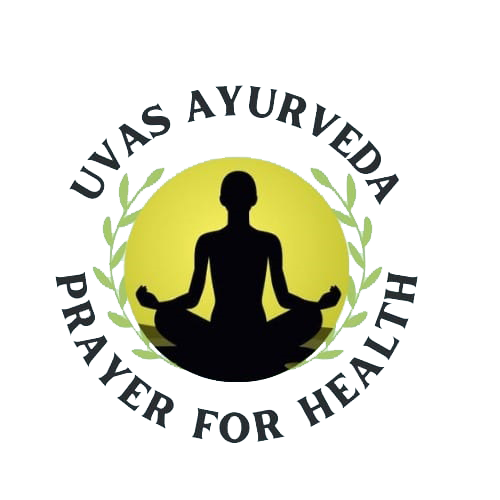Knee joint pain is one of the common conditions in the present era. Previously it was seen mostly in elderly persons but today due to lifestyle changes it is seen even in the young generation. Knee or joint pain at any stage of life is painful, however, the health problem striking early on is scary as one just dreads living with it in so many years to come.
Sandhigata Vata is one of Vata Vyadhi characterized by symptoms such as Sandhishoola (joint pain) and Sandhishopha (swelling of joint). Osteoarthritis (OA) is a degenerative joint disorder. OA of the knee joint comes under the inflammatory group which is almost identical to Sandhigata Vata described in Ayurveda concerning etiology, pathology, and clinical features.

In Ayurveda, knee joint pain is commonly referred to as Janu Sandhigata Vata.
Causes
- Excessive Vata dosha in the body can lead to dryness, cracking, and degeneration of the knee joints.
- Weak digestion results in the accumulation of toxins (ama)
- Lack of physical activity
- Overexertion, repetitive stress, or knee injuries
- Consuming foods that aggravate Vata, such as cold and dry foods
Symptoms
- Pain, swelling, and stiffness in the knee joint
- Difficulty in walking, climbing stairs, or performing daily activities
- Cracking or popping sounds in the knee
- Limited range of motion and flexibility in the knee joint
- Weakness and instability in the knee
Importance of Panchakarma therapy
Panchakarma treatments work on the root cause of knee pain by eliminating toxins, reducing inflammation, and improving joint mobility. Here’s how it helps:
Eliminating toxins: Panchakarma removes harmful toxins from the body that might contribute to knee pain.
Reducing inflammation: The therapies in Panchakarma, such as Snehan (oil massage) and Swedan (steam bath), alleviate inflammation and promote healing.
Improving joint mobility: Treatments like Basti (medicated enema) and Virechan (purgation) boost digestion and metabolism, which aids in improving joint function.
Treatments
- Oleationtherapies such as Abhyangam, Janu Vasthi, Janu Pichu
- Swedana therapies like valuka pottali, Jambeera panda swedam,
- Ptrapinda swedam, choorna panda swedam
- Dhara – kashaya dhara, taila dhara
- Navara kizhi
- Veshtanam / Upanaham
- Basthi/ enema – decoction enema and oil enema
- Virechanam
- Agnikarma- Agnikarma is an effective nonpharmacological, para surgical procedure for pain management in Sandhigata Vata
Veshtanam
It is the procedure in which a paste is prepared with the herbal plants that have the capacity to reduce pain and swelling such as Eranda patra(RICINUS COMMUNIS), tamarind leaves, drumstick leaves ect and it is applied on the affected knee and is tied by coverings an Eranda leaf . The duration is usually 12 hours and if it is applied in the morning should be removed in the evening or if its tied in the evening should be removed next day morning. It helps to reduce the pain and swelling.
This can also be done using only oil that has the Vatahara property and it is called as Thaila Veshtanam.
Herbal remedies: Ayurvedic herbs like Shallaki (Boswellia), Guggulu (Commiphora mukul), Ashwagandha (Withania somnifera), and Dashmool (a combination of ten roots) are commonly used to reduce inflammation, relieve pain, and improve joint health.
Dietary modifications: Following an anti-inflammatory diet that includes warm, nourishing foods can help pacify Vata and support joint health. Some examples include cooked vegetables, soups, whole grains, and healthy fats like ghee.
Lifestyle modifications: Regular gentle exercise, such as yoga and walking, can help improve joint flexibility and strength. Avoiding excessive strain on the knees and maintaining a healthy weight are also important.
External therapies: Local applications of Ayurvedic oils, such as Mahanarayan oil or Dhanwantharam oil, Kottamchukkadi oil can provide relief from pain and inflammation. These oils can be gently massaged onto the affected knee joint.
In Uvas Ayurveda one of the reputed Ayurvedic centres in Bangalore, we treat such diseases and we have got good results as well. Here we conduct all types of panchakarma therapies like vaman, Virechana, Basthi, Nasya, leech therapy, Sirodhara, Sthanika Basthi, Dhara, Navara kizhi etc and it is conducted by experienced therapists under the guidance of Ayurvedic Physicians.
Uvas Ayurveda is also a School of Ayurveda and conducts many ayurvedic online and offline courses for Ayurvedic enthusiasts to gain more knowledge and help to understand Ayurveda in Deep. We conduct courses such as Garbha malta Sanskar, Ayurvedic cosmetology, ayurvedic therapy course, Diet and Nutrition, Obesity course, etc.


Leave A Comment